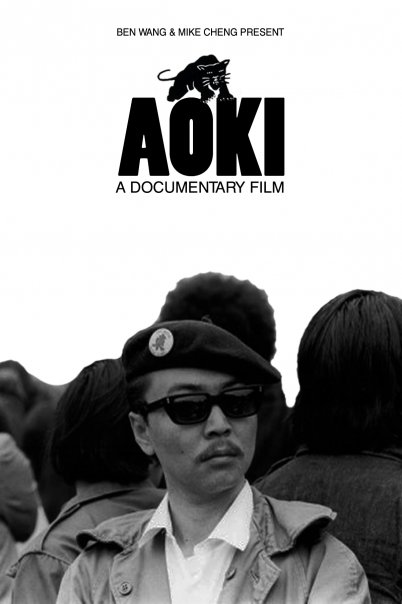
Premiering on Thursday, November 12 in Oakland, CA, is the documentary Aoki, a celebration of the life of Japanese American activist Richard Aoki, one of the first members of the Black Panther Party. Filmmakers Ben Wang and Mike Cheng filmed their labor of love over the last five year's of Aoki's life, documenting his life story as a child in the Topaz internment camp, his formative years in Oakland and in the US military, his work as Field Marshall of the Black Panthers, and his life-long dedication to activism up until his death this past March at the age of 71.
The filmmakers blend Aoki's speeches and interviews with commentary from friends and colleagues including Bobby Seale, Kathleen Cleaver, and his biographer Diane Fujino, capturing the passion -- and wicked sense of humor -- of a man of the people.
The film will be particularly special, and maybe bittersweet, for those who had met or knew Richard Aoki. Watching the trailer again, I felt extremely sad that he was not physically here anymore (the filmmakers presented a rough cut screening in 2008, where Aoki was present). I had the privilege of meeting him several times as a journalist and at various events, and he made a big impression on me.
Though Richard Aoki was a legendary figure among certain activist circles, many people today don't know about Richard Aoki -- or that there were even Asian Americans in the Black Panther Party. Aoki was an Asian American who stood in solidarity with African Americans and also fought on the frontlines of the Third World Liberation Front student strike with the Asian American Political Alliance. Now his story will finally be shared with the wider public on the big screen.
Hyphen's own film editor Sylvie Kim caught up with Wang and Cheng as they gear up for the Aoki premiere at the Grand Lake Theater in Oakland. Read her Q&A with the filmmakers below.
Had you known much about Richard before meeting him as students? What was that first interaction like?
Ben Wang: Before I met Richard I had read a few interviews and articles about him in Giant Robot, Legacy to Liberation, and AsianWeek. Already a hero of mine, I was floored when he agreed to meet with us and ended up talking with us for three to four hours at a café in Berkeley. We were conducting an interview for a student newspaper called Third World Forum so we talked a lot about Richard's experience in the Black Panther Party, his role in the Third World Liberation Front Strike, and the current state of imperialism. I was really impressed by his commitment to the struggle and enjoyed his wit and humor.
Mike Cheng: I first learned about Richard while I was in high school. I never knew there were militant Asian Americans involved in the struggles for social justice in the '60s and '70s. The day that Ben and I first met Richard changed my life forever. I was young and angry at the world and I knew I wanted to do something with my life to fight white supremacy and the oppression of people of color but I didn't really know what to do with myself ... Listening to Richard share some of his old war stories as well as his analysis on current world events inspired me. I felt a strong connection to the ideas that he was expressing because I personally didn't grow up with the disposition to be a pacifist and prior to meeting Richard those were the only types of activists that I had ever met. I still remember going home that night in awe of everything that Richard had been through and telling myself that if I was gonna be serious about struggling for freedom, justice, and equality I needed to step up my efforts and dedication. I've tried to do that ever since, and that first meeting Richard was the catalyst.
One of the great aspects of the footage of Richard's speeches is that the backdrops vary: in one clip he's speaking behind a podium and microphone giving an outdoor speech and in others he's sitting in front of a small classroom white board. What have you observed about his commitment to working with communities both big and small?
BW: Richard was always commited to supporting organizations and causes that he believed in big or small. I think it speaks to his character that he would still get really pumped up for events or meetings even if there were only a few people in attendance.
MC: One of the things that I think a lot of people respected about Richard was the fact that if he supported the principles of a certain political cause he wouldn't hesitate to throw his support behind it whether it was a hot button issue with a lot of momentum behind it or if it was a smaller event hosted by organizers struggling to get their movement out there. As a result of being connected to many different communities and groups Richard was a highly sought after speaker for many different events. And if he felt they were doing good work he supported them period.
Was the five-year production time a conscious choice or were there struggles in completing the film?
BW: As first-time filmmakers with full-time day jobs, we didn't fully realize the amount of time and resources that it would take to create a feature length documentary. We pretty much learned everything as we went along. In some ways our filmmaking inexperience was a drawback, but we were committed to telling Richard's story and hopefully that comes across on the screen.
MC: When we first started the film I don't think either Ben or myself thought that it would take us as long as it did to complete the project. Looking back I think the amount of time that it took is a reflection of the growth that we needed as people, not just filmmakers, to really digest all the lessons that Richard shared with us over the years. When you shoot over 75 hours of footage and boil it down to a 94-minute film you need that perspective, especially if you're a first time filmmaker with a day job learning as you go along.
A lot of Asian American activist elders passed in 2009. Are you hoping this documentary will spark something with younger Asian Americans who may not be familiar with the contributions of older generations? What are your thoughts on Asian American activism today?
BW: I hope that Richard's story can help younger Asian Americans be proud of who they are and to get involved in struggles for social justice. Richard's legacy might help folks to focus more on real issues in the community instead of so much emphasis on identity politics.
MC: My goal for this documentary is to help bridge the gap between the younger and older generations. Now that Richard has passed away that goal has become even more real and more serious to us. Schools and mainstream publications don't teach the youth about people like Richard so I hope the film can be a tool for that. A lot of times at meetings or conferences about Asian American activism I'll hear folks discuss and question what their place is in the movement today. I think the stories of our elders can be part of the answer to that question. The history of Richard Aoki and other Asian American activist elders is our history. It's our lineage. They laid the foundation for us to pick up where they left off. They are our examples and our role models, we don't have to repeat the same mistakes thanks to the work that they put in and I don't mean that disrespectfully. No elder that I've ever talked to wants the younger generation to simply re-invent the wheel and copy what they did. We're standing on the shoulders of the elders and we can't let their efforts be in vain.
What is TWF Films working on currently?
BW: I want to learn more about filmmaking and work on some projects in the future. I have a few projects in mind, but nothing to announce publicly at the moment!
MC: TWF Films is currently trying to get Aoki as widely distributed as it can. While we want to bring the film to as broad an audience as possible, we particularly hope the film can reach Asian American youngsters interested in learning more about Richard and the Asian American Movement. We hope we can get Aoki into as many film festivals, community organizations, and school campuses as possible. As for future projects, that remains to be seen.
-- Sylvie Kim
+ + +
Aoki screens on November 12 at 8:00 pm at the Grand Lake Theater, 3200 Grand Avenue, Oakland, CA and will be followed by a Q&A with the filmmakers. Pre-sale tickets are available online.
Cheng and Wang inform us that DVDs will be available for purchase at the screening. For those who are unable to attend and for out of towners, check the Aoki website for updates on future screenings in other cities as well as how to purchase the DVD. For inquiries, email them at AokiFilm [at] gmail.com.
About the filmmakers: Aoki is directed, produced, filmed and edited by Ben Wang and Mike Cheng. Ben and Mike met Richard Aoki in 2002 while they were students at UC Davis. Their original intent was to interview Richard for their student organization’s newspaper, Third World Forum, but they ended up striking a friendship with Richard that would progress over the next seven years until his passing in March 2009. As Richard became a social justice activist mentor to Ben and Mike, they felt compelled to capture his history and experiences in a documentary despite having no previous filmmaking experience. Ben lives in Oakland and Mike lives in Berkeley and both are currently active members of the Asian Prisoners Support Committee.






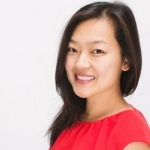
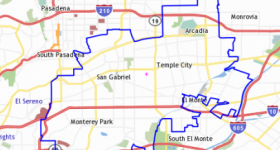
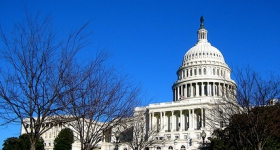
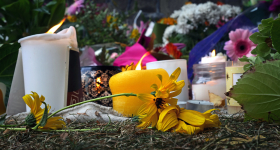
Comments